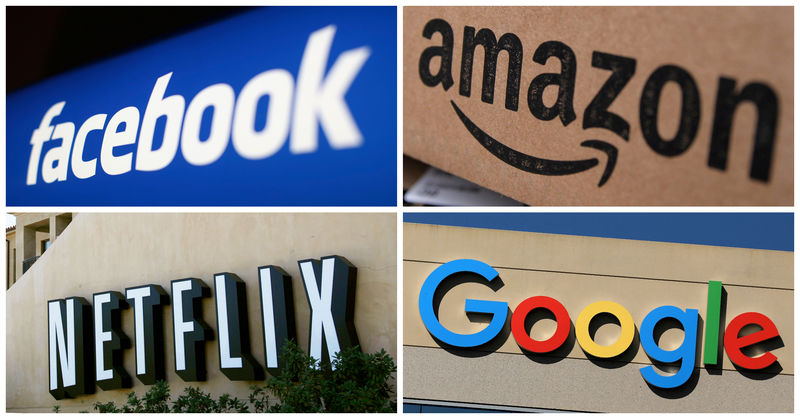By Kate Duguid
NEW YORK (Reuters) - In March, noted short-seller Andrew Left took a swipe at Netflix Inc's (O:NFLX) stock, calling the online video company's aggressive spending on content acquisition "unsustainable."
The stock took a brief dive on the Citron Research chief's assertion, but the volume of bets against it has since dropped to the lowest in at least half a decade.
Netflix bonds are a different story.
Bearish bets against the company's $8.4 billion of junk-rated bonds have more than tripled this year to an all-time high of $347 million, according to data from Samuel Pierson, analyst at IHS Markit.
"The short balance in the actual bonds reflects a view that (the bonds) will decline in value if or when they issue more debt," he said.
That is likely with growing competition between video-streaming services. Such platforms, including deep-pocketed rivals like Amazon Prime (O:AMZN), AT&T Inc's (N:T) HBO Go and Hulu - whose biggest backer is Walt Disney Co (N:DIS) - have spent billions to acquire the rights to TV shows and movies and to make their own.
In 2017, Netflix spent $7 billion on content and has estimated an increase to $8 billion in 2018. "We'll continue to finance our capital needs in the high-yield market," Chief Executive Reed Hastings wrote in his second-quarter shareholder letter.
A Netflix spokesman declined to comment.
Even debt investors with long positions in the bonds agree the short-sellers have a case.
"There is money to be made in the short-term" by betting against Netflix debt, said John McClain, portfolio manager at Diamond Hill Capital, who is long the debt.
Those bets appear to be paying off.
The two most shorted of Netflix's bonds - $2.9 billion of paper maturing in 2026 <64110LAN6=> and 2028 <64110LAQ9=> - hit record low prices last week, with the November 2026 bond dropping below 92 cents on the dollar. Their yields, which move in the opposite direction, have risen above their coupon rate.
Bonds can be shorted, or bet against, in much the same way as stocks. The short-seller borrows the securities from a bondholder and then sells them, hoping they can be bought back later at a lower price and returned to the original owner, pocketing the difference as profit.
Still, short-selling bonds - as opposed to betting against them in derivative markets such as credit default swaps - is far less common than shorting stocks, largely because bonds are far less liquid than stocks. They can also be pricey to trade because the short seller must pay interest to the securities' lender and pay any scheduled interest and principal payments owed to the bondholder.
Short positions in the U.S. high-yield market total about $28.5 billion, according to IHS Markit, a fraction of the $980 billion of shorted equities.
A FANG IN BONDLAND
Netflix, one of the so-called FANG stocks alongside Facebook Inc (O:FB), Amazon and Google parent Alphabet Inc (O:GOOGL), has a relatively new but hefty presence in the high-yield bond market.
"Netflix is the highest quality business that's ever been in high yield," said McClain, adding he did not believe the short positions have anything to do with credit fundamentals.
Moody's Investors Service earlier this year upgraded its rating one notch to "Ba3," three notches into junk territory. It is rated "B+" by Standard & Poor's, four notches into junk.
Netflix, which went public in 2002, had a modest debt load in its early years, but it has issued a net $7.5 billion of bonds in less than three years. Its long-term debt as a percentage of total capital has roughly doubled to 65 percent since the end of 2014.
More is likely to come. Netflix will have $14 billion in debt by 2020, Jason Kim, senior analyst at Goldman Sachs (NYSE:GS), estimated, making it one of the largest issuers in the high-yield market.
"We expect the next capital raise to come in the fourth quarter of 2018," Kim said.
Netflix is likely to be pressed on its issuance plans by Wall Street analysts on Tuesday when it reports third-quarter earnings.
Investors are also betting that Netflix bonds will fall because they are expensive compared with similarly rated companies. The yields on its two most shorted bonds are as much as 70 basis points below the average yield in the Bank of America/Merrill Lynch BB-B High Yield Index <.MERH0A4>.

"Netflix bonds are trading well above their credit rating," said Neil Begley, senior analyst at Moody's. Their implied credit rating, based on Moody's analysis of the trading data, went up to investment grade in 2016. On average, the bonds have traded three or four notches above their credit rating for the past two years.